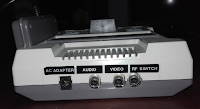Very obviously a complete ripoff of the original Nintendo Famicom design.
It has a pair of 15pin connectors for joypads on the front, which are apparently the same as the real Famicom's expansion connector.
Retains the dust cover of the Famicom.
A fairly generic Family Game style clone controller, complete with turbo buttons and unfortunate circular d-pad.
Both controllers are marked "1". There are variants I've seen which have independently marked 1 and 2 player controllers, and some which even retain the second player microphone, so I'm not sure what happened on this model.
Expected complement of AV out, audio out and RF modulator. RF has never been tested.
Standard 60 pin famicom-style connector: Supports Famicom expansion audio and interestingly, the chips inside seem to run at PAL frequencies because genuine Famicom games run slightly slow, and PAL games are just right.
3 month guarantee label on the bottom might suggest a date of about 1996, but may not be original.
Quite similar to most other Family Game systems I've seen on blogspot, but notably the styling isn't identical. Less curves in general, mean, aside from the grey coloring and engrish language text, it looks very very similar to the real thing. It also doesn't have any "built in" games, so it predates that wave of famiclones, too.
It's actually the 8-bit Nintendo system I use the most, simply because there's none of the vagaries of the 72pin connector or lockout chip. It seems pretty close to the "real thing", though internally it's quite, quite different.








